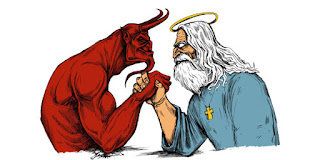In between looking at the pictures of my "Collected Works of Beatrix Potter" I have been dipping into a couple of books by Richard Tarnas. In them he asks what is the impact of experiencing existence as a conscious purposeful being in an unconscious purposeless universe. It would seem to be the "impact" that Nietzsche foresaw following "the death of God" and the Copernican revolution that set our earth in motion around the sun.......
 |
| The question is asked |
........"are we not plunging continually" Nietzsche cried......."do we not feel the breath of empty space".........."has not the night become colder?"........before going mad and weeping at the sight of a horse being whipped.
 |
| Nietzsche |
Tarnas sees our basic assumption being that any meaning and purpose the human mind perceives in the universe does not exist intrinsically in the universe but is constructed and projected onto it by the human mind. Tarnas goes on to question this assumption........
Might not this be the final, most global anthropocentric delusion of all? For is it not an extraordinary act of human hubris - literally a hubris of cosmic proportions - to assume that the exclusive source of ALL MEANING AND PURPOSE IN THE UNIVERSE is ultimately centered in the human mind, which is therefore absolutely unique and special and in this sense superior to the entire cosmos? To assume that the universe utterly lacks.........what we human beings conspicuously possess? To assume that the part somehow radically differs from and transcends the whole?
(Emphasis is as per Tarnas)
"When consciousness ends in the skull, how can joy exist?" asks the Blue Cliff Record.
"Whoever told people that 'Mind' means thoughts, opinions, ideas, and concepts? Mind means trees, fence posts, tiles and grasses"
(Dogen)
Well, this is all something to think about when seeking to digest the turkey and stuffing. Or in between enjoying the pictures of Mrs Tiggy-Winkle or Jemima Puddle-Duck.
Happy Christmas everyone. Sincere best wishes to all.
















































